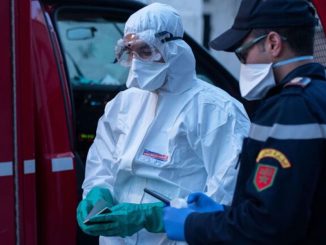
The virus reproduction rate reached 0.95 at the end of the past week (August 24-30), as reported by the Ministry of Health on Tuesday. It stressed that the epidemiological situation is not good despite an improvement in the data compared to the previous week.
According to the Ministry’s weekly statement on the national and international epidemiological situation, the development of the virus reproduction rate has increased significantly with the lifting of the containment, before gradually declining. It reached 1 at the beginning of last week and then decreased to 0.95 at the end of this week.
While reporting these weekly data (August 24-30), the coordinator of the National Center for Emergency Public Health Operations at the Ministry of Health, Mouad Mrabet, said that 9,050 new cases were registered, including 42 imported cases, in addition to 223 deaths. As for the number of people cured, he noted that the past week saw an increase in the number of cases of 8.2% and a slight decrease in deaths of 3% compared to the previous week. “The weekly infection rate has increased from 27 to 25 per 100,000 people,” he said.
A decline in the number of active cases and their rate per 100,000 people had been recorded during the past week, he noted, with the last figure ranging from 38 to 39 cases per 100,000 people.
The weekly change in the rate of positive tests, per 100 laboratory tests, showed a decrease from 6.4 to about 5.8%, after recording an increase with the lifting of the containment.
Answering questions received via the WhatsApp application, Mr. Mrabet said that the potential for transmission of the virus through blood remains very low according to the World Health Organization (WHO) and that recurrence of the disease in people who have already had it is also very rare (up to two cases). He also noted the lack of scientific studies proving the effect of consuming clove infusion on protection against Covid-19.
As for awareness messages, Mr. Mrabet focused on people being treated at home, explaining that they should not show clinical symptoms or signs, nor risk factors or psychological distress, in order to comply with preventive measures, in addition to having an adequate isolation room inside the home.
“This category must avoid leaving the house, sitting with family members and using common areas, stay away from people with fragile immunity, avoid receiving visitors to prevent the spread of the epidemic, and respect the hygiene measures followed inside the home,” he concluded.




Be the first to comment